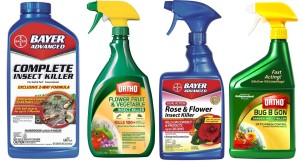
Neonic Pesticides Found in US Tap Water
By Dan DeBaunShare
A new study conducted on US drinking water has found traces of insecticides that are widely used around the world in tap water supplied to US homes. This is the first time scientists have detected neonicotinoids — a commonly used type of pesticide — in drinking water.
Previous studies have found neonicotinoid contamination in US streams and rivers, but this latest study — which was recently published in the scientific journal Environmental Science & Technology Letters — reveals that these highly toxic chemicals are finding their way into water sources that provide drinking water to US homes.

Water samples obtained by researchers from Iowa have revealed that concentrations of some toxic neonic chemicals remain unchanged even after treatment. However, they point out that drinking water supplies treated with a different filtration method saw neonic levels diminish substantially. The researchers say that they cannot currently comment on the potential health impact this may have on humans, but argue that additional studies are needed in this regard.
Neonicotinoid pesticides, first introduced in the 1990s and now widely used across the globe, consist of systemic chemicals that are typically applied as a seed coating which kills insects but not other species. In the ten years between 2004-2014 sales of neonic pre-treated seeds tripled in the United States. However, while they have been touted to be harmless to other species, there is growing concern over the negative impact they are having on the environment, particularly their impact on bees. As a result, the European Union have placed a moratorium on the use of neonic pesticides on flowering crops since 2013.
A 2015 study conducted by the US Geological Survey (USGS) revealed that neonic chemicals were widespread in water samples taken from 48 different US streams and rivers. This latest study, conducted by a team of scientists from the University of Iowa and the USGS, assessed drinking water treated by two different filtration plants. Water samples treated at the University of Iowa's treatment plant removed hardly any of the three primary neonic chemical contaminants: thiamethoxam, imidacloprid and clothianidin, while water samples treated at the Iowa City water treatment plant removed a substantially higher amount of these contaminants, removing 85%, 94% and 100% of these chemicals respectively. Drinking water treated by the less effective water filtration system had between 0.24-57.3 nanograms of individual neonic chemicals per liter.
"These are very low levels, these are nanograms per litre which means parts per trillion, a very low concentration," said Prof Gregory LeFevre, a contributing author of the paper, in an interview with BBC News. "But at the same time there are concerns about what those low levels might do from an exposure standpoint."
The Environmental Protection Agency (EPA) is responsible for regulating drinking water contaminants in the US, but currently neonic pesticides are not listed as a potential threat or cause for concern.
Prof LeFevre points out that these results don't necessarily point to a violation of the system, but it is important that we are aware that they are present in drinking water, regardless of whether these levels are safe or not.
The authors are more concerned that neonic insecticides may be transformed into other harmful products during the filtration process, which could pose a larger health threat to humans than direct exposure to neonic insecticides that are designed to selectively target insects.
But the study does present evidence that filtration of drinking water using activated carbon filters is an effective and economical method of removing neonics from drinking water.
"We were pleasantly surprised to see how well the activated carbon worked," said Prof LeFevre.
The researchers believe that considering the extent of research that's been conducted focusing on the impacts of neonics on pollinators, particularly bees, as well as other species, it is vital that further research is conducted on neonic presence in drinking water in order to determine the level of human exposure globally.
"Without really good toxicity data it is hard to ascertain the scale of this, but whenever we have pesticides in the drinking water that is something that raises a flag no matter what type of concentration it is," said Prof LeFevre.
The Berkey water filter has not yet been tested for neonicatinoid removal, but is confirmed to be on the testing schedule.
Journal Reference
KL Klarich, NC Pflug, EM DeWald, ML Hladik, DW Kolpin, DM Cwiertny, and GH LeFevre. Occurance of Neonicotinoid Insecticides in Finished Drinking Water and Fate during Drinking Water Treatment. Environ. Sci. Technol. Lett., April 5, 2017. DOI: 10.1021/acs.estlett.7b00081
-
Regular price $234.00 USDRegular priceUnit price / per
-
Regular price $327.00 USDRegular priceUnit price / per
-
Regular price From $367.00 USDRegular priceUnit price / per
-
Regular price From $408.00 USDRegular priceUnit price / per
-
Regular price From $451.00 USDRegular priceUnit price / per
-
Regular price From $478.00 USDRegular priceUnit price / per
-
Regular price $332.50 USDRegular priceUnit price / per
$350.00 USDSale price $332.50 USDSale

Dan DeBaun
Dan DeBaun is the owner and operator of Big Berkey Water Filters. Prior to Berkey, Dan was an asset manager for a major telecommunications company. He graduated from Rutgers with an undergraduate degree in industrial engineering, followed by an MBA in finance from Rutgers as well. Dan enjoys biohacking, exercising, meditation, beach life, and spending time with family and friends.
~ The Owner of Big Berkey Water Filters















